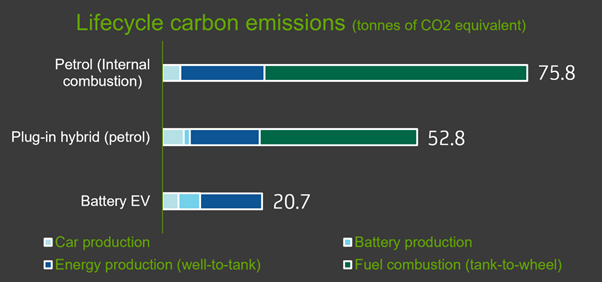The environmental benefits of EVs
What the LEXperts say
Encouragingly, EVs produce fewer greenhouse gases and air pollutants over their lifetime compared to petrol and diesel cars. For our part, Lex Autolease assesses the entire life cycle of an EV’s emissions, providing a more accurate comparison with petrol vehicles.

The environmental impact of any vehicle depends on a few key factors including its size and how it's powered. Larger vehicles naturally use more energy, but with EVs, that energy can come from cleaner, renewable sources.
When looking at the full picture – from manufacturing to daily use – EVs produce significantly fewer emissions than petrol or diesel cars. And as the UK’s energy grid becomes greener, EV emissions are expected to fall even further by 2030.
Cleaner air, healthier communities
The electricity used to power an EV affects its overall environmental impact. Charging with renewable energy significantly lowers lifetime emissions, making EVs an even cleaner alternative to petrol or diesel vehicles.
Overall, EVs have better life cycle emissions than their petrol and diesel equivalents. It is estimated that driving an EV will result in almost 70% fewer carbon emissions.
Since EVs have fewer mechanical components, they should last longer than traditional vehicles, and require less frequent replacement, which further reduces their carbon footprint.
Making the switch to an EV isn't just good for your carbon footprint – it's better for everyone around you too. This is because fewer exhaust fumes mean cleaner air in your neighbourhood and healthier lungs for your community. We've already seen this positive change in action with London's Ultra-Low Emission Zone, where air quality has noticeably improved as more drivers go electric.
If you keep your EV for at least 20,000 miles (which most of us would do anyway) and try to use green energy for charging when possible, you're doing the planet a bigger favour than you might realise. It really does make a difference compared to sticking with traditional petrol or diesel options.
Article published June 2025